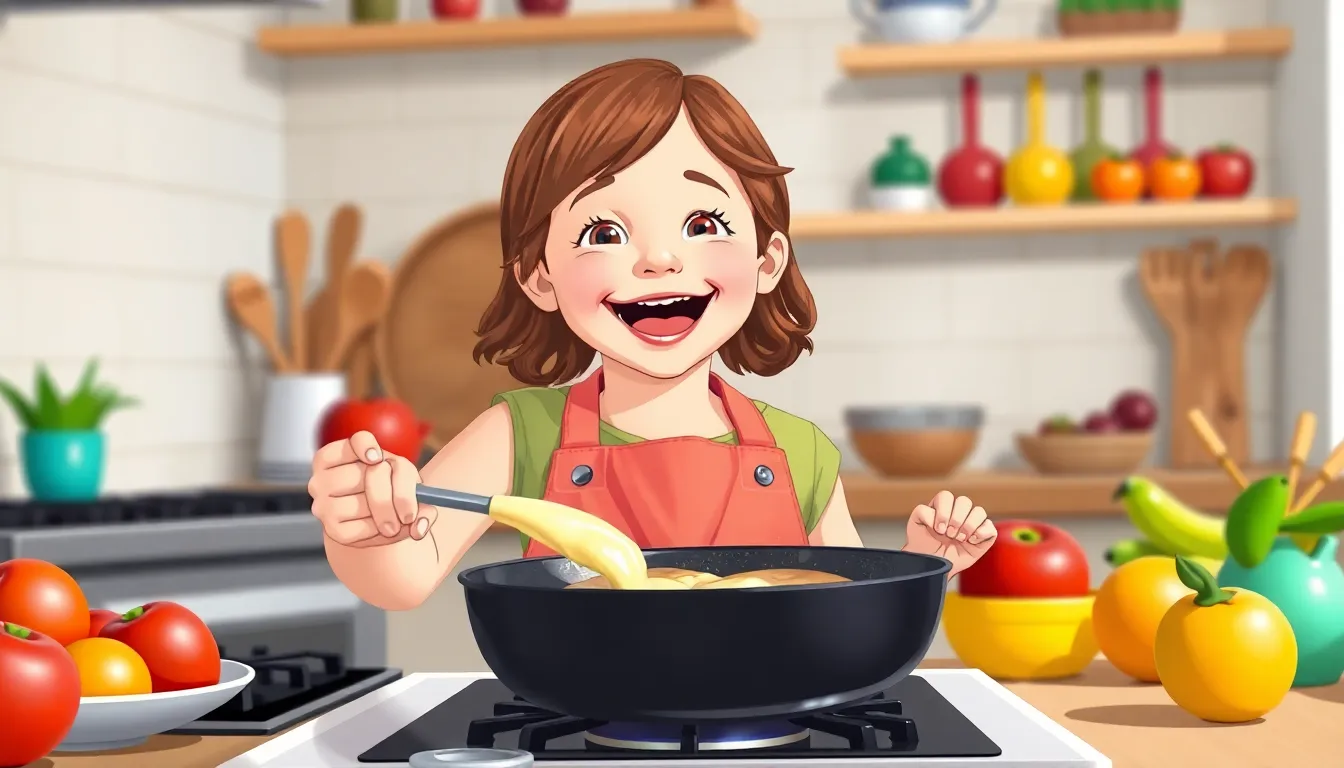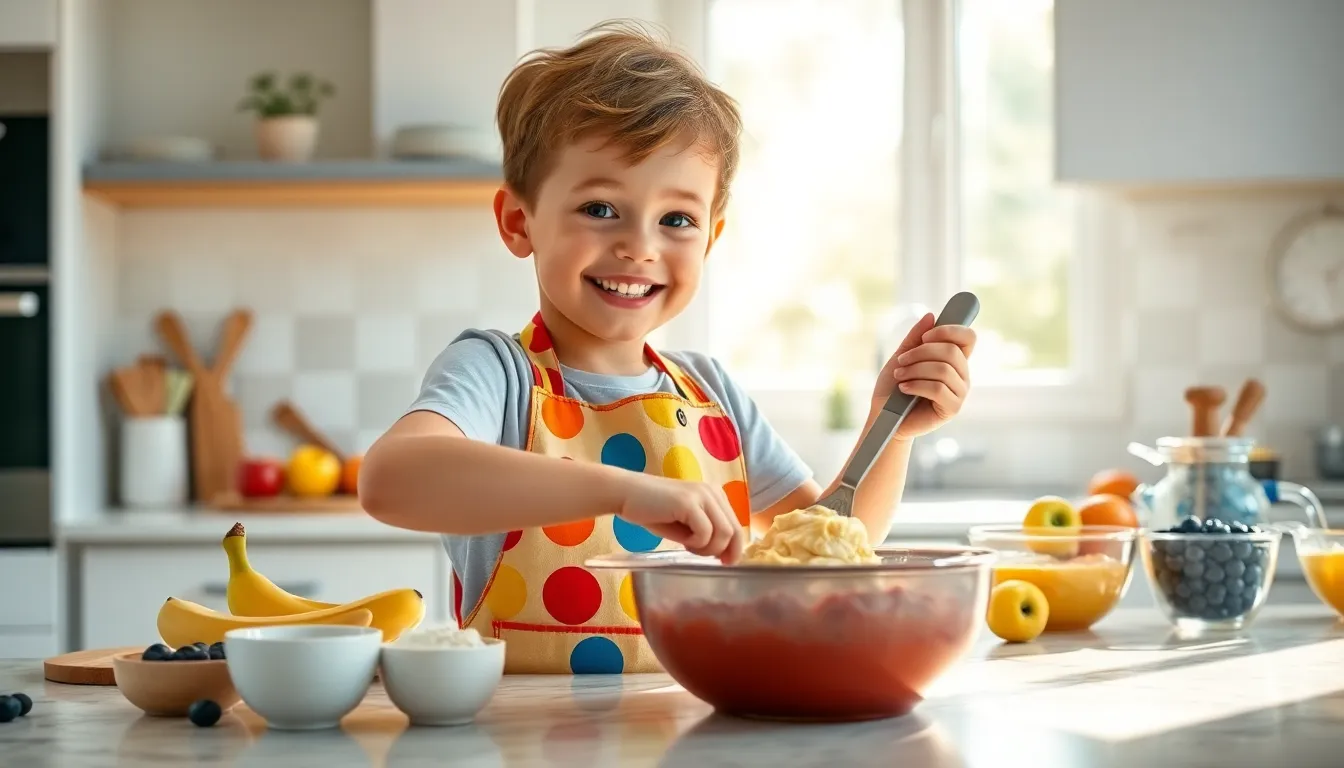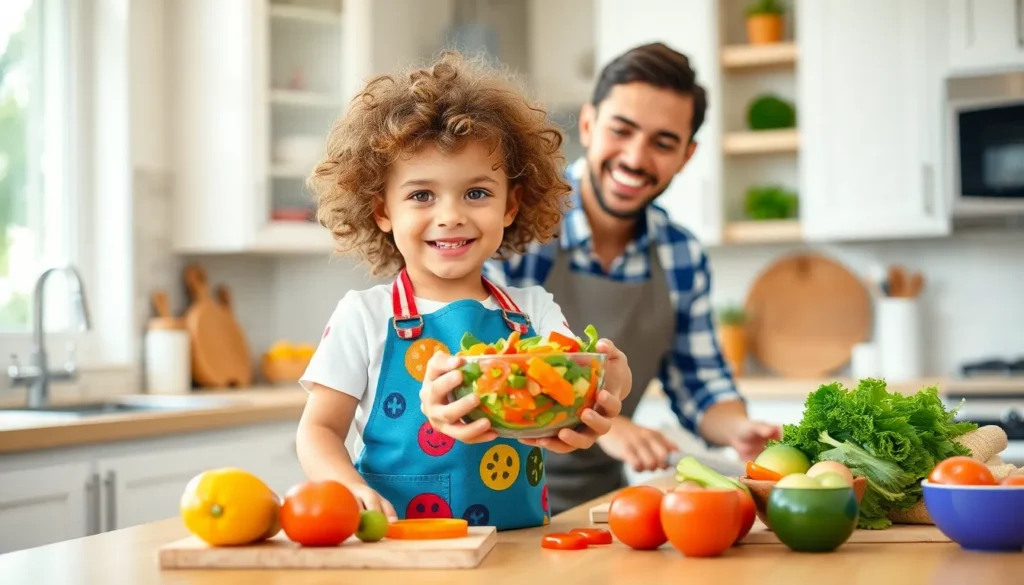Cooking with kids can feel like a chaotic episode of a cooking show gone wrong, but it’s also one of the most rewarding experiences a parent can have. Imagine the laughter as flour flies and the joy of creating something delicious together. Not only does it spark creativity, but it also teaches valuable life skills—like how to wield a spatula without causing a kitchen disaster.
Cooking With Kids
Cooking with kids creates memorable moments and helps develop essential skills. This experience fosters growth in various areas, from social interactions to food awareness.Promotes Bonding
Bonding occurs naturally when families cook together. Shared tasks like chopping vegetables or stirring pots promote teamwork. Parents engage kids in conversations about ingredients and recipes, enhancing communication skills. Laughter often fills the kitchen as family members experiment with flavors. Cooking together can strengthen relationships and create lasting memories, encouraging openness and trust.Encourages Healthy Eating
Healthy eating habits form early through cooking experiences. Kids learn about nutrition by selecting fresh ingredients. Exploring various vegetables and fruits increases their likelihood of trying new foods. Parents can discuss the benefits of balanced meals during preparation. Engaging in cooking activities also makes the food more appealing, leading to better eating choices. Encouragement during these moments supports a lifelong appreciation for nutritious foods.Easy Cooking With Kids Recipes

Breakfast Ideas
Pancakes offer a simple, delicious breakfast choice. Kids can measure flour, pour milk, and mix the batter. Customize them with fruits like bananas and blueberries. Scrambled eggs allow for hands-on experience with cracking eggs. Kids enjoy adding cheese and vegetables, making it a versatile meal. Smoothies present another easy option. They can select ingredients, like spinach and yogurt, and blend them. Each breakfast idea builds confidence in young cooks.Lunch Options
Quesadillas represent a straightforward lunch option. Children layer cheese and veggies between tortillas before grilling. Sandwiches provide creativity and variety. Kids choose their favorite spreads, proteins, and toppings. Pizza adds more excitement. Children can spread sauce, sprinkle cheese, and arrange toppings. Each lunch promotes decision-making and teamwork among young chefs while offering tasty meals.Fun Snacks
Fruit kebabs deliver a healthy yet fun snack. Kids can thread pieces of their favorite fruits onto skewers. Trail mix offers another easy choice. Children combine nuts, seeds, and dried fruits for a personalized blend. Veggie sticks paired with hummus create a nutritious option that encourages exploration of flavors. Each snack idea fosters creativity and helps kids develop healthy eating habits.Safety Tips For Cooking With Kids
Cooking with kids involves responsibilities, particularly regarding safety. Ensure a secure and enjoyable experience by following these tips.Age-Appropriate Tasks
Assign age-appropriate tasks to make cooking fun and manageable. Young children can measure ingredients and mix batter. Older kids might chop vegetables or manage simple stove tasks. Tailoring activities to their abilities promotes engagement and confidence. For example, a five-year-old can help assemble fruit kebabs while an eight-year-old can handle spreading toppings on pizza. Gradually increase the complexity of tasks as their skills develop. Engaging them at their level fosters a sense of accomplishment and encourages learning.Kitchen Safety Essentials
Implement kitchen safety essentials before cooking begins. Establish clear rules about touching hot surfaces and sharp objects. Remind kids to wash hands before handling food to prevent contamination. Provide child-safe utensils, such as plastic knives for younger children, to help minimize accidents. Keeping a first aid kit readily accessible adds an extra layer of preparedness for minor injuries. Encourage attention to spills on the floor to avoid slips. Cultivating a culture of safety in the kitchen helps them learn to respect the space and tools.Engaging Kids In The Kitchen
Cooking with kids leads to valuable experiences that foster connection and learning. Involving children in the kitchen cultivates important skills while making lasting memories.Teaching Kitchen Skills
Children gain practical skills when they participate in cooking activities. Tasks like measuring, mixing, and chopping introduce them to fundamental kitchen techniques. Younger children can practice measuring ingredients or washing vegetables while older kids can learn to operate simple kitchen appliances. Mastery of safe knife skills and heat management enhances their confidence. Experiencing these tasks empowers children to feel capable and independent in the kitchen. Educational moments that arise during cooking help them to understand concepts like fractions or timing, reinforcing academic lessons in a fun environment.Inspiring Creativity
Creativity flourishes when kids experiment with flavors and ingredients. Encouraging children to design their own meals opens a world of possibilities. Composing a pizza or assembling a sandwich allows them to explore combinations without strict guidelines. They might mix unexpected ingredients, leading to unique creations. Allowing input on presentation fosters artistic expression, making the meal visually appealing. Kids gain a sense of ownership over their dishes, enhancing their willingness to try new foods. This exploration supports open-mindedness about diverse culinary experiences, further enriching their appreciation for cooking.
They might mix unexpected ingredients, leading to unique creations. Allowing input on presentation fosters artistic expression, making the meal visually appealing. Kids gain a sense of ownership over their dishes, enhancing their willingness to try new foods. This exploration supports open-mindedness about diverse culinary experiences, further enriching their appreciation for cooking.



